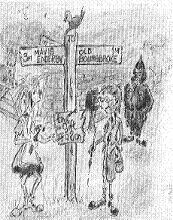
I listened to John Humphreys interviewing the Archbishop of Canterbury yesterday. The basis of the programme, which was one of three, the other two being with leaders of the Jewish and Muslim 'faiths' in Britain, is that Humphreys asks them to overcome his scepticism about the existence of God.
As expected, it was a waste of time.
What is it about this word 'faith'? If you honour any idea, however outlandish, with the label 'faith', it is treated with respect. Why? If Humphreys were interviewing the Prime Minister, he would be quite happy to call him, effectively, a crook, a liar, a cheat, dishonourable, self-serving, self-deluding, etc . . .etc. But he treated the Archbishop as a wise man, who appeared to possess some secret mystery, that he, Humphreys, just couldn't grasp. Rather like me talking to Albert Einstein about relativity.
First question: 'You cannot say for certain, can you, that you know that God exists.'
Reply (more or less): 'I believe in the reality of God.'
Don't you call that begging the question?
And neither man defined what he meant by 'God'. Zeus? Odin? An inner light or some transcendent personal being? Voltaire's clockmaker or an unknowable immanent universal force? Even so-called Christians can't agree. There is a world of difference between the God of the evangelicals and the Catholics and the one preached (oh so politely) by liberal theologians. And what's all this about Jesus being the Son of God?
The trouble with the Archbishop is that he's not an evangelical. They do know. They have a personal relatonship with him, talk to him, have prayers answered, know about miracles. They say. Of course, sometimes the answer to a prayer is no, and more often than not the miracle doesn't happen. They still don't know, in the way I know they're is a computer in front of me at this moment. (Don't tell that it's a figment of my imagination and that nothing exists outside my own consciousness. You may be right.)
If something demands faith before it can be believed, then you have to be pretty desperate to believe in it. No-one, for example, can prove there are no unicorns in the world. So why do I feel no need to live as if there are unicorns? All it takes is faith. With God, it's partly cultural, but I think it's fear, primarily. If there is no God, of any sort, there are no easy answers to the beginning and end of the universe or of our own lives. We have no meaning. We have no fundamental moral rules to live by. We are all alone in a cold, alien universe, random specks of life, as meaningless as a brief spark from a fire.
Does God intervene in the world, they discussed. Does it conflict with free will? And so on to the old chestnut about a loving God allowing wars, disease, genocide, and so on. It was taken as read that God is loving. It was taken for granted that man has free will, forgetting that many Christians do not actually believe it. 'By their fruits shall ye know them' it says somewhere in the Bible. Original sin makes all human actions sinful, according to Calvinists and others who believe in the sovereignty of God. Of course, they have contradictons of their own to contend with.
The Archbishop steers clear of such fanaticism, preferring to accentuate the 'niceness' of Christianity, to which he would never try to convert anyone. 'Faith is a gift,' he says, forgetting for a moment that God does not intervene. No, I forget, we can use our free will to reject that gift.
So, let me get this clear. I have the choice to accept a gift called 'faith', which is a decision to believe something which is not defined and for which they're is no proof and which may be in total contradiction to the belief of somebody else, who has also accepted this gift.
Beware of Archbishops bearing gifts.
(The cartoon, by the way, was found on The Cartoon Blog)
Oxymoron of the day: A theological scholar

No comments:
Post a Comment